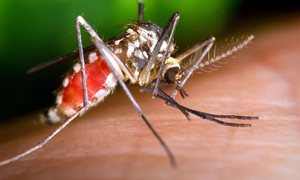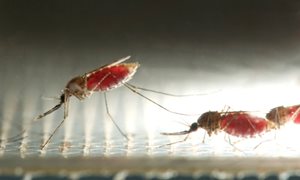
Joep Joosten, theme Infectious diseases and global health, and colleagues determined the composition of PIWI protein complexes to provide novel insights into the piRNA pathway. They published this recently in Cell reports.
Aedes aegypti mosquitoes are responsible for the transmission of arthropod-borne (arbo)viruses which may cause debilitating diseases such as dengue and zika. As arboviruses need to replicate within the mosquito in order to be transmitted to a new human host, the mosquito antiviral immune response is critically important in determining arboviral disease burden. In recent years, a novel antiviral pathway has been discovered in mosquitoes, which is based on the recognition of viral RNA by small RNAs called PIWI-interacting (pi)RNAs. The research group of Ronald van Rij (dept. Medical Microbiology) has spearheaded efforts to uncover the molecular mechanisms and functions of the mosquito piRNA pathway.
In their most recent paper, which was published in Cell Reports this week, Joep Joosten and colleagues determined the composition of PIWI protein complexes to provide novel insights into the piRNA pathway. Joosten: “In collaboration with the lab of Michiel Vermeulen, we performed comprehensive proteomics to identify PIWI protein interactors. Using these data, we uncovered two new components of the mosquito piRNA machinery: Pasilla and a protein we termed Atari. Pasilla has previously been described to be an important regulator of alternate splicing, yet, in mosquitoes, a cytoplasmic Pasilla isoform is expressed that is crucial for the production of piRNAs.
The second piRNA pathway component that we characterized, Atari, provides a platform for RNA substrates and PIWI proteins to generate and amplify piRNA molecules. As this amplification process is termed ‘ping-pong amplification’, we decided to name the gene Atari, after the platform on which the arcade game pong was first released. Aside from discovering two previously unknown components of the piRNA machinery, our proteomics data provides a wealth of information to inform further follow-up studies.”
Related news items

Grants for research on magnesium deficiency and malaria Vidis for Felix Hol and Jeroen de Baaij
1 July 2022 Radboudumc researchers Jeroen de Baaij and Felix Hol both receive an NWO Vidi grant for their research, respectively on magnesium deficiency in type 2 diabetes and on malaria. go to page
Field research on malaria vaccine offers unexpected surprise
23 May 2022Field research on the effectiveness of a malaria vaccine, came up with unexpected results for an international group of researchers including Benjamin Mordmüller of Radboudumc. The vaccine evokes a broader response against malaria proteins than there are in the vaccine.
go to page
Rubicon grants awarded to three RIMLS researchers
19 April 2022Three researchers have received Rubicon funding from NWO/ZonMw. This will enable Elke Muntjewerff, Laura de Vries and Laurens van de Wiel to do research at a foreign research institute for the next two years.
go to page


